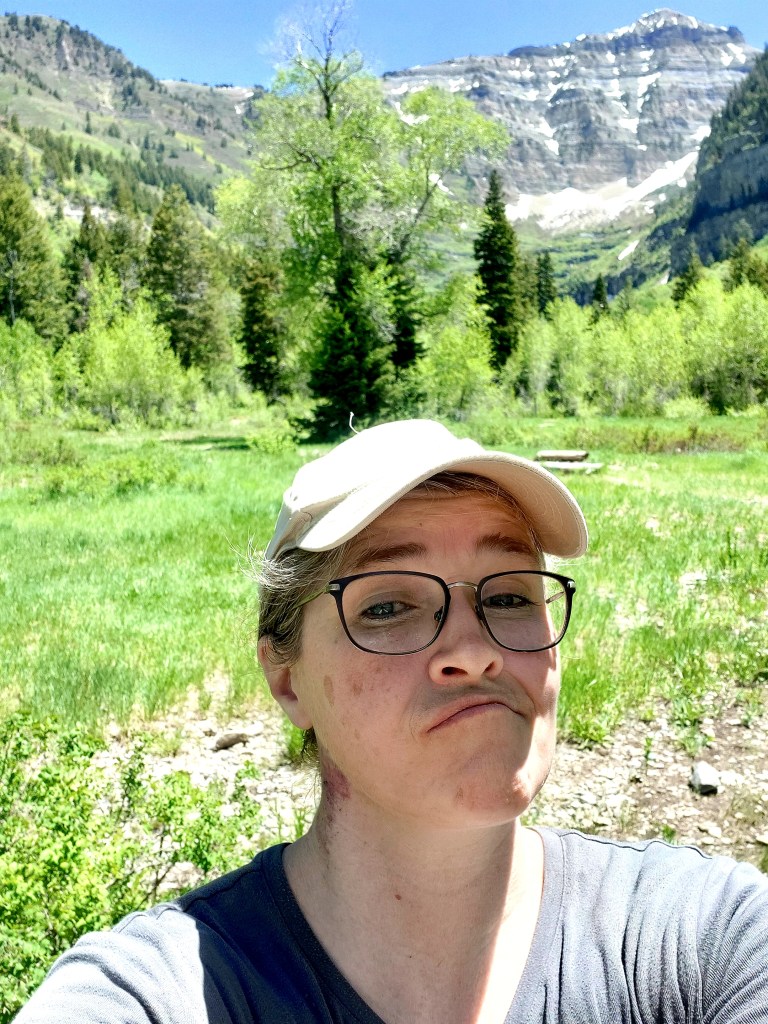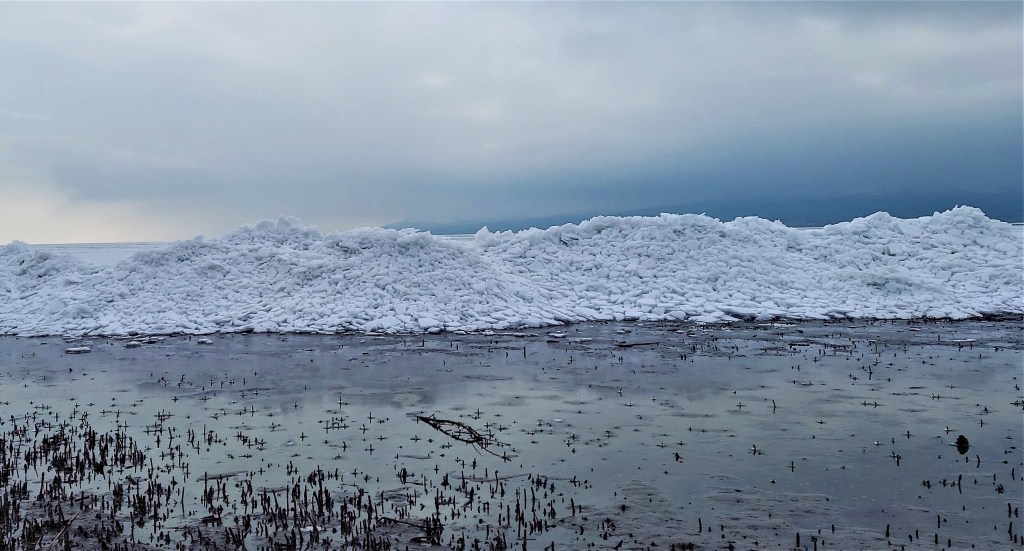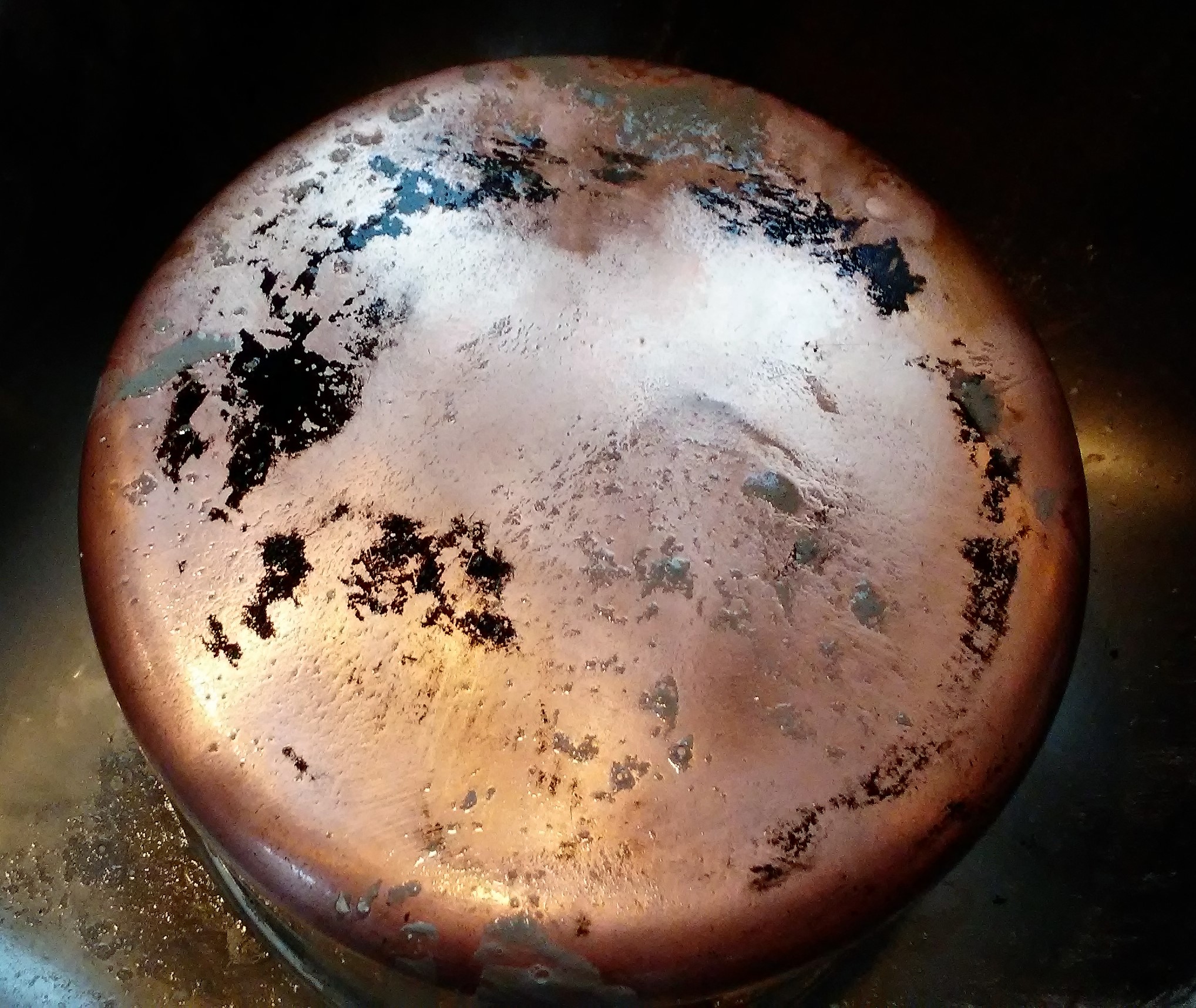Meet my nemesis for the past 43 years: Mt. Timpanogos, in Utah County, Utah.
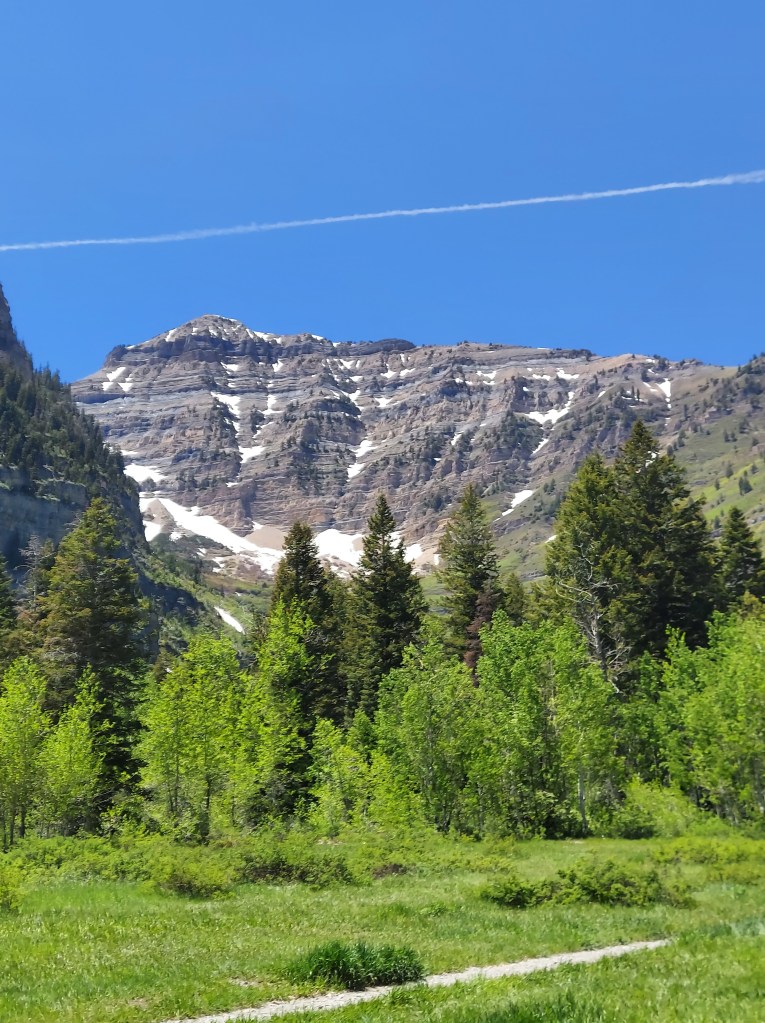
It’s massive, gorgeous, and has no idea that I’ve felt it mocking me since I was 9 years old.
That was when my dad—born and raised in Germany and loving all its mountains–finally relented to take me on his yearly hike. For years, every August, he’d leave before dawn with a group of neighbors and teenagers from our church, and guide them on a 13.5 mile hike, with a 4,800 foot elevation gain, ending at an elevation of 11,749 feet and fantastic views of Utah Valley below.
I always wanted to be part of it, and when I was nine, Dad agreed.
He shouldn’t have.
For as excited as I was, I spent the first five hours complaining and whining about the switchbacks and steepness, but did pause to admire the waterfalls my father loved. He’d tell me kindly to enjoy the views and conserve my oxygen by not talking.
Once we reached Emerald Lake, aptly named for its deep blue-green water, I was too exhausted to continue up the last steep stretch to the summit. Nauseated and dizzy, I confessed it was all too much for me. My dear, gentle father merely nodded, then squatted. “Get on my back,” he said.
Now, understand this: He was in his mid-40s then, did this hike only once a year, and wasn’t in the greatest shape himself, although he liked to pretend he was. Yet he didn’t hesitate to carry me along dangerous scree fields and narrow trails, to the summit of Timp. I remember him sweating, although the temperature was only in the 50s with a steady breeze. But he maintained a steady pace for another 1,300 feet up, depositing me at the summit.
I’ve never forgotten that view, his immense service, and the fact that I couldn’t make that last, hard stretch on my own.
Ever since, I’ve sworn to myself I would summit that mountain without assistance.
To sum up, I’ve never scaled it again because of motherhood, living outside of Utah, and simply knowing I’d never make it.
Just last summer I found a journal entry my dad wrote about that ill-fated attempt. Always a little ashamed that I begged so much to go, only to fail my dad at the end, I was astonished to read his account: he felt immense guilt for taking me, for seeing me “suffer at Emerald Lake with clear signs of altitude sickness.”
Altitude sickness?
He wrote that he prayed earnestly that I wouldn’t get worse, and knowing that he was responsible for the other dozen people in our group, carried me the rest of the way, also praying the last hour that his footing would be sure, that I would be ok.
That shifted 43 years of guilt and filled me with renewed gratitude and sympathy for my sweet dad, who did the climb for the last time in his 70s (which took him and an even older cousin visiting from Germany about 12 hours round trip).
Next month I move away from Utah for the third time, this time to Florida. I don’t know when, if ever, I’ll move back.
I’m now 52 years old and last week realized that if ever I was going to tackle that mountain, it had to be NOW. Never mind training or practicing (I always had lists in my head of what I’d do to prepare for it). Time was running out. Work circumstances mean that my husband and sons have already moved to Florida, while I remain here with my teenage daughter for another month, couch surfing with relatives and friends.
But last Tuesday morning she was to leave early for a day camp, and I realized I had no other obligations after I dropped her off, so . . .
Why not hike Timp?
When else would it ever happen?
I could take it slow—that’s what I read about high altitude sickness: taking lots of breaks helps. I didn’t need to summit. I really just wanted to see Emerald Lake again. I have only vague memories of it, and included it in my books as a “glacial lake.” But I wanted to be there, just to show my dad—and me—that I can do it. Dad died a few years ago, but he’d still know.
Honestly, though, I’m not in the greatest of shape. I’m overweight, but I have great endurance. I’d just have to walk steadily upward, for about 3,500 feet, for 7 miles, over 4-6 hours’ time. Easy.
(If you’re not yet seeing how naïve I was just a couple of days ago, keep reading.)
That was my thinking as I packed a backpack with protein bars, gluten free rolls, dried apple rings, two Vitamin Water bottles, a plain water bottle, and a 32 oz water bottle. I also packed a jacket, bandaids, first aid kit, toilet paper, wipes, and plastic baggies, because I’m a mom and I go everywhere prepared for a minor emergency.
My husband, 3,000 miles away, was concerned.
“But I’ll go slow,” I promised him, “Besides, Timp is a hugely popular hike. The websites even say to get there before dawn because you can’t get a parking place.”
My husband had one condition: “No matter where you are, by 12:30, start heading down. I know it’s faster going down, but you shouldn’t be up there, alone, that long.”
“I won’t be alone!” I reminded him. “There will be dozens of people passing me every hour.”
But when I got to the parking lot at Aspen Grove at 8: 15 am, was startled to see it so . . . empty.

“Weird,” I murmured as I got my pack and put on my jacket. It was 45 degrees even though it was a sunny morning on June 9.
The more astute of you already know why the parking lot wasn’t full with hikers. You noticed it on the first photo I posted. But I wouldn’t see it for another few hours.
I put on my hat, took two aspirin to stave off the migraines I always get when I’ve been in the sun, said a prayer of gratitude that my knees felt great, my chronic back and hip problems were absent (I’m telling you, I’m really NOT in the best of shape), then ended the prayer with what I’d been saying for the past five days: “Dear Father, if at any time I’m about to do something beyond my abilities, make it clear to me. Thank you for the opportunity to say good-bye to the mountains before going to Florida, and please keep me from doing something dumb.”
I end a lot of prayers like that.
I headed out on the peaceful, quiet trail, dutifully signed in at the hiker’s register with what time I arrived and what my destination was, and took a photo of the map of the trail, then began.
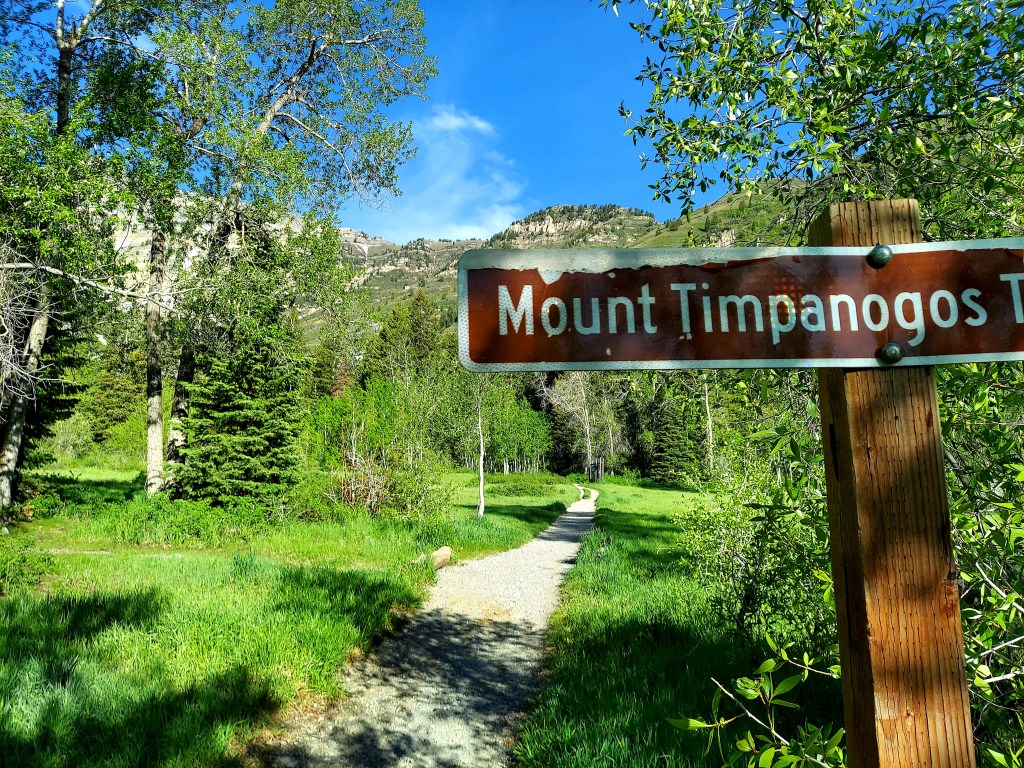

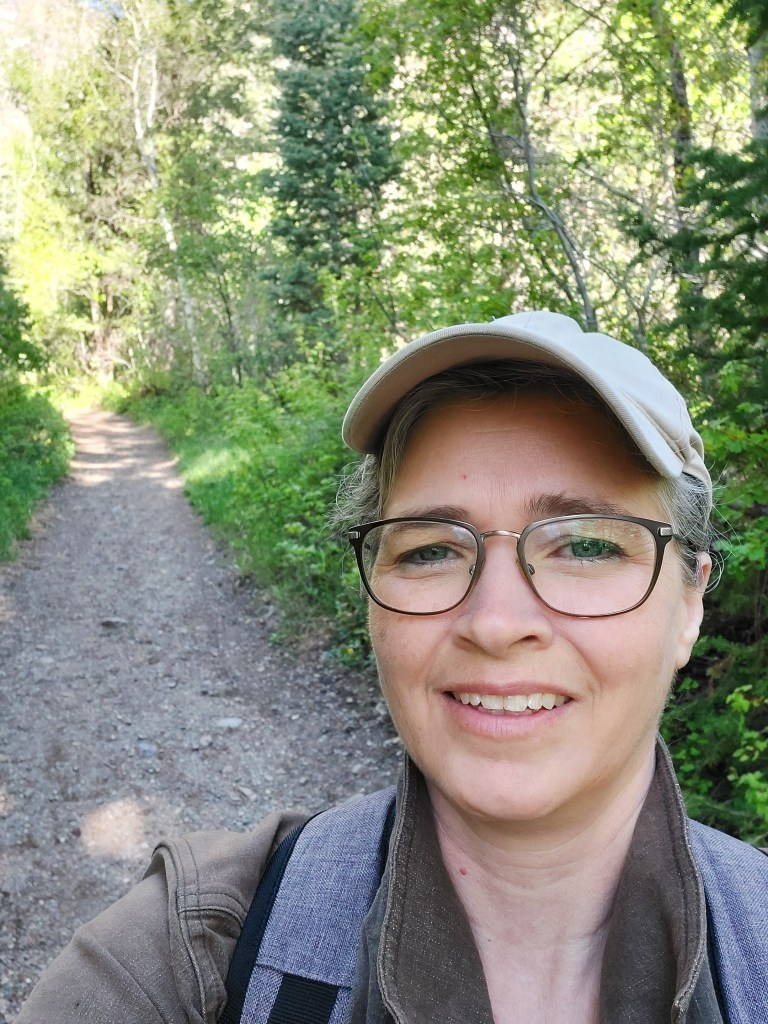
And became winded about half a mile later when the path began a very slight climb.
Did I mention that I’m asthmatic? But never got it diagnosed properly so I don’t have an inhaler?
Also that I have a tachycardiac heart that likes to suddenly jump up for no reason and stay at 120 bpm, even when I’m sitting?
I needed motivation, already, so I put in my earbuds and let the heroic trailer music of Audiomachine, Two Steps from Hell, and Satou Naoki propel me.
When I hit the first waterfall, I was feeling confident. Stopping frequently to take pictures of scenery and wildflowers gave me time to slow down my breathing and heart.

Occasionally I wondered why I hadn’t seen ANYONE else on the trail, but that thought would pass quickly, because I had a perpetual smile on my face.
It’s rare for me to have a day where NO ONE needed me—none of my nine kids, or grandkids, or high school students I teach, or anyone. It was a day just for me, all alone.
Some people are afraid of solitude. I embrace it.
Besides, when no one else is on the trail, you can sing out loud with “Moana” and no one will glance at you with pity.
It was an hour before I heard something behind me: “May I pass?”
I looked back in time to see a man jogging—yes, JOGGING!—up the trail behind me, in only thin shorts and a t-shirt, with a water bottle in one hand. He was as agile as a mountain goat, and my jaw dropped to realize he was at least in his 60s.
I stepped aside, astonished as he continued jogging up the steep terrain which had me gasping and stopping every 100 feet. (I’d already taken off my jacket, sweating too much with it on, appreciating the cool breezes when they came, the temperature in the 60s by then.)
And, I’ll admit, I was very humbled by Grandpa Runner.
For about 15 seconds. Then I realized he must be one of those Iron Man runners and that this was not typical “hiking Timp” behavior. I didn’t have to be like him. I just had to be me.
And I went back to singing (gasping) along with “Moana.” (“So . . . <wheeze> shiny!” <wheeze>)
Another half hour passed with me stopping frequently, panting, crawling up rocks, sitting under pine trees, waiting for my breathing and heart to calm down again, listening to music and soaking in the sheer audacity of those giant peaks. I noticed that nearly every time I started again, I was only a dozen paces away from a flattened area, or a waterfall I could hear but not see. In other words, I almost gave up a little too soon, but was always rewarded for continuing on.


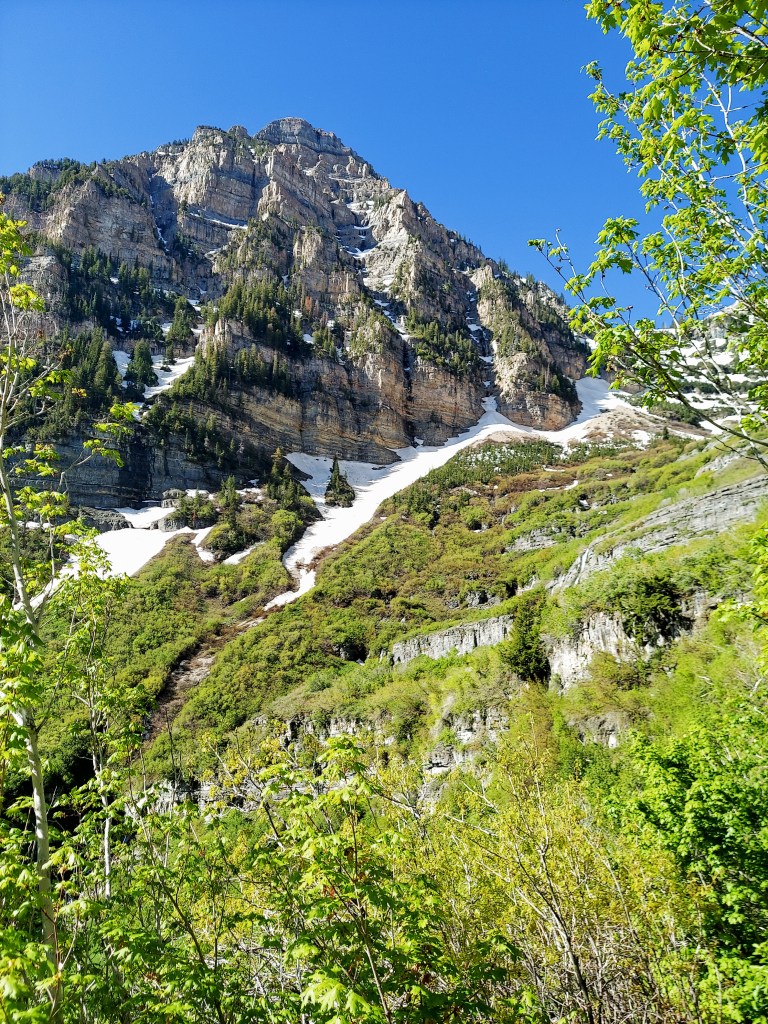

But it was hard. Really hard, especially with no one to push or encourage me. Why was I insisting on this? No one would know or care if I gave up.
Weirdly, experiences with childbirthing came to mind, times I had to endure because I no other choice. As I struggled over a twist in the trail requiring climbing up rocks and my backpack felt like 50 pounds, I remember my last delivery where for hours my unborn son and I battled each other for life, and I felt my own start to slip away. But we obviously made it. So could I, again.
It was at the end of that second hour, and probably another 1400 feet in elevation, that I saw the next two people on the trail, coming down, which meant they started much earlier that morning than I had.
And they were OLDER STILL!
What was this, Geriatric Day on Timp?!
This couple was at least in their 70s, but in great shape. Slender and sprightly, they both had hiking poles and boots with spikes, and were startled to see me.
“How far are you planning to go?” they asked.
Something about their question prompted my own. “How far do you think I can make it?”
They shook their heads. “Only to the second snow field,” they said sadly.
“The what?”
They pointed up the mountain side, to the snow patches that looked only a few inches deep a few thousand feet lower, but now I realized must have been several feet deep.
Suddenly I saw it, what some of you likely saw immediately: the trail was buried under snow and ice. The treacherous switch backs between fields of loose shale and rock was layered with slick, slushy snow.

That was the reason no one else was hiking that day.
THAT’S why my dad always went in August, not early June.
Suddenly I understood I wouldn’t make it to Emerald Lake. I could see where it was, and it was literally impossible to reach.
That filled me with both disappointment and relief. I wouldn’t have to try to make it all the way on my own.
And once again, the mountain defeated me, just by being itself.
The elderly couple advised me to be careful, that they expected to see me down at the bottom “soon.” “Even that jogger couldn’t get across the second snow field,” they told me, and a few minutes later I saw him come back down, still at a clipped pace as I caught my breath once again under a pine tree.
The second snow field was now my goal.
Eventually I reached a point where I could see where the steep set of switchbacks were supposed to be, buried. For the first time that morning I was filled with concern.
I was alone on that mountain at that elevation, and going too far would be DUMB.
I came to the first snow field, proven to be accessible by senior citizens, and marveled how they went across. The slope was noticeable, the snow—probably still a foot deep—was melty and slushy and very slick. Hunched over, I ventured across, keeping my feet at sharp angles for traction (have I mentioned that I wore only well-broken in tennis shoes, with no tread?), and plodded across the 40 feet with only a little sliding.

I felt something, for just a brief moment, and it wasn’t until I reached the other side that I identified it: fear.
I rarely feel fear. Oh, not that I’m super brave. I’ve got buckets of anxiety to spare. But fear isn’t in my daily repertoire of emotions.
Except for right then. Maybe this was God, keeping me from doing something dumb.
Enormously relieved, and ignoring the fact that I’d have to go back the same way, I headed for my final destination: Second Snow Field. It’ll never show up on any map, but it will forever be my New Goal which I reached proudly about 15 minutes later.
I paused to evaluate the challenge, a little disappointed that such a narrow patch thwarted those older and fitter than me, then realized why the others turned back. It wasn’t far across, as you can see, but very, very steep, even with boots with cleats and hiking poles. And take a look at the snow fields beyond. Even worse.

Should one slip, it’s quite a slide down, maybe a couple hundred feet, and at the bottom is a pile of flat, sharp rocks which would continue your slide for another 50 feet until you hit the trees. There’s no easy way out of that, and I didn’t fancy the idea of a helicopter lowering my broken, scraped-up body a rope.
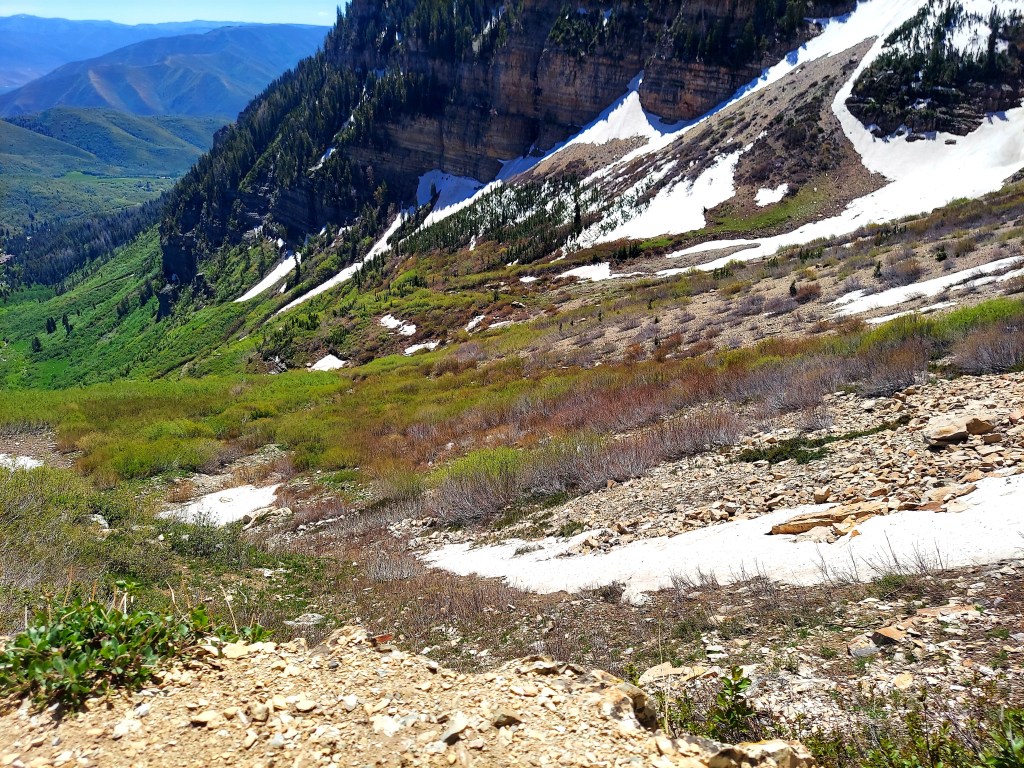
And there was no sign of any members of AARP coming up the trail.
Still I sat there for a moment, looking critically beyond the field to where the trail was supposed to be, momentarily annoyed that my goal was seemingly so close (it really wasn’t) and that I’d come so far (again, not really–maybe only four miles and 2,000 feet in elevation; my blue dot of progress looked even sadder on Google maps).
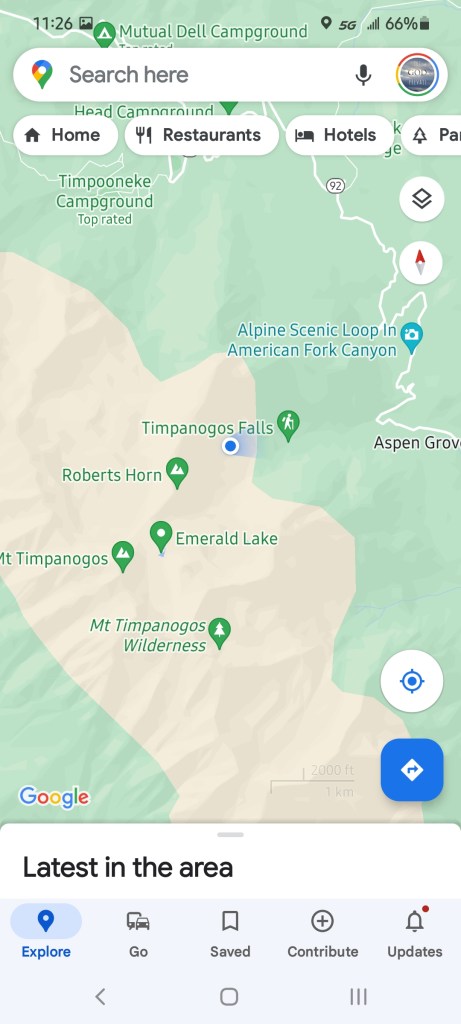
And that’s the second time I felt it—fear. Only this time, the feeling stayed, boring deep into my soul, along with the words that going on would be “foolish, possibly fatal, and worse—wholly unnecessary.”
(Red squiggles on the photo below indicates the likely path I would have made struggling on the switchbacks.)

I sighed, then backtracked a few feet to a wide ledge where I decided was a perfect spot for my lunch. I sat down in the deeply awesome stillness, alone in the vastness, feeling to my left peace and joy, and to my right, intensely sinister fear.
(The parking lot is to the left of my shoe.)
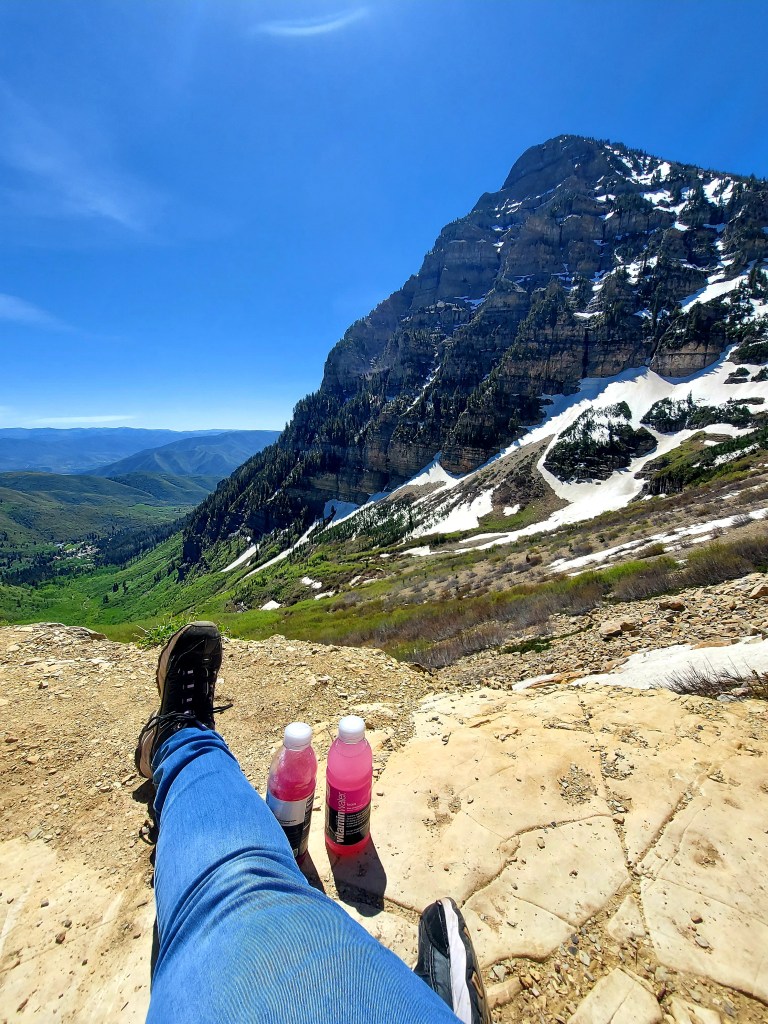
And weirdly I found my thoughts filled with my ancestors, Germany, and WWII.
I’ve researched a lot about the War which plays such a big part of my ancestry. And I have wondered if my relatives could have done anything more against Hitler.
But as I looked again at the rugged, snow-covered slopes, a new understanding came to me: my ancestors had done all they could, gone as far as was possible.
My maternal great grandfather had been coerced by the Nazis to join their party and lend credibility to their cause, and he rebuffed their advances, finally embarrassing them away to leave him in relative peace.
My paternal grandfather was threatened at least twice at gun point by Nazis trying to extort money from him, and he talked his way out of every conflict.
But there were no stories of outright defiance or hiding of Jews (although my mom’s family knew of a few Jews who weren’t taken, but forgotten by the Nazis, and no one in their city ever turned them in. Those Jews survived the war.).
And as I stared at the treacherous slopes, I understood that their trying to do more would have been “foolish, possibly fatal, and wholly unnecessary.” As if they single-handedly could have stopped the Nazi war machine. Sheesh.
Sobered, and feeling foreboding ahead–physically and metaphorically–I leaned back against the rock and closed my eyes for a 15-minute nap to let my tired, wobbly legs become stable again.
And spent 15 minutes smacking giant ants who must have just emerged from hibernation and decided I was good enough for lunch.
I finally said farewell to the mountain which suddenly seemed threatening, and started down.
This time the first snow field filled me with stabs of fear until I got across it.
About 15 minutes later I came across a hiker, and I was not surprised at all to realize he was another senior citizen. He was also well-prepared, and asked me how far I made it. Then he asked, “Do you have a spare water bottle?” Not long before, he encountered a couple of 17-year-olds, wearing shorts, tank tops, and with only bottle of water, already empty. “This is their first hike,” he told me, rolling his eyes, “and they think they’re going to summit. Ha!”
A few minutes later I found the clueless kids, leaning against a tree and panting. I smiled and said, “So you’re the teenagers who think they’re going to climb this today yet know nothing about hiking?”
They sighed. “Met that old guy, huh?”
“Yep. And he’s right.” I handed them my spare water bottle which they eagerly, happily accepted.
“Can we make it to the saddle?” they innocently asked, showing me the spot on their map on the phone.
I looked them up and down critically, now that I was an expert since I’ve spent two hours more on the mountain than they have. “Nope, not without boots, spikes, jeans, and poles. And not even then.” I pointed out a snow field, explained how it was slick, showed them the scree fields, explained how shale is sharp and unstable, then said, “I don’t want to see you on the 10 pm news, being rescued by helicopter. The saddle? See that area on the mountain, wholly covered by snow?”
They nodded soberly.
“It’s impossible, guys. Go to the first snowfield, then call it a day and head back down.”
They looked at me as if I was there to kill their joy, but I saw in both of their eyes secret gratitude that they didn’t have to try to go any further than a mile or more.
I continued on my way down, surprised at my stamina, thrilled with how fast the descent was (I never needed my trailer music) and in about an hour and a half, I was at the bottom, having never met any other hikers.

And it was over, just like that.
I think the time went so quickly because my mind, which connects everything in metaphors, realized that much that day is symbolic of the Last Days.
Russell M. Nelson, prophet for The Church of Jesus Christ of Latter-day Saints, said in April 2020 that the return of the Savior was coming, and that “It is our charge—it is our privilege—to help prepare the world for that day.”
We need to prepare ourselves first in order to help the world. My five hours on the mountain taught me this (and I can see why Moses, Enoch, Nephi, and others learned so well from God on mountains):
- First, the Last Days are coming, sooner than many may expect. We keep thinking we’ll have time later to prepare, but we’ll quickly discover time is running out. I did my hike earlier than I expected, and was not as ready as I wanted to be. But I did as much as I could, and that was enough.
We have to hike anyway when the time comes. - It will be a lot harder than we expect, with greater problems than imagined. I underestimated the mountain, and I had to dig deep into my memory for times I had endured and continued to keep me motivated. Remember that up until now, you’ve survived 100% of problems thrown your way. Make a mental list today of what you’ve overcome, so you can remember when you feel you’ll never succeed again.
- Take time to pause and rest, but NEVER leave the path. Few of us would be able to run up that mountain, nor is that expected. There will be times we sit in frustration and exhaustion to catch our breath, but never take a foot off that trail! Never leave the covenant path.
Just get moving again once you’re able again. - There will be fewer on this journey with us than we imagine. For whatever reasons, a lot of people won’t see the need or desire to deal with what’s coming.
- Interestingly, a lot of older folks will be. I speak to many my age (50s) and older, and 9 out of 10 of us are prepping, bracing, watching, waiting.
But with younger generations, it seems to be about 1 out of 10. In my very narrow observations, they don’t see it or want to see it. (Maybe you witness better ratios? I’d love to hear what you’ve noticed.) - And those few younger ones who are trying to brave the “coming mountain/challenge” are ill-prepared. We have to help them with whatever we have.
But, like the parable of the Ten Virgins, we can’t give so much that we no longer have anything. Had I made it to Emerald Lake, I know my water supply would have been gone, and I would have had nothing to share with the teenagers I met.
We need to be teaching younger generations what we already know, not just send them out with their phones and hope they’ll do ok. - We have to know how far we can reasonably go. Just as I realized my ancestors couldn’t go any further in their efforts to fight fascism in Germany—efforts which would have been foolish, potentially fatal, and unnecessary—so too may be some of our desires to help in these Last Days. We may want to “conquer the mountain,” but it would destroy us instead, and the mountain wouldn’t even notice. But our families and friends would.
- The “secret combinations” of darkness that are in power now will be impossible to take down, nor do we need to. Not that Timp is a secret combination, but it’s a massive entity that didn’t even notice my presence. That wasn’t the hill I wanted to die on, metaphorically or literally.
This is God’s fight, and He asks us to help here and there, rescue as we can, but it’s not our job to stop what has been prophesied. (See Revelation and Ezra for explanations of how Babylon will destroy itself.)
The best we can do is get out of the way of Babylon and help those we find trying to escape it. That’s hugely comforting and doable.
In the end, I didn’t “conquer the mountain.”
Nor, more importantly, did it conquer me.
I simply walked away from it, satisfied with what I could accomplish and glad that I still had strength for the rest of the day.
It’s no longer my nemesis. I felt strangely indifferent to it as I drove away. Maybe it’s because I have more vital tasks ahead of me, and I can let this prideful one go.
